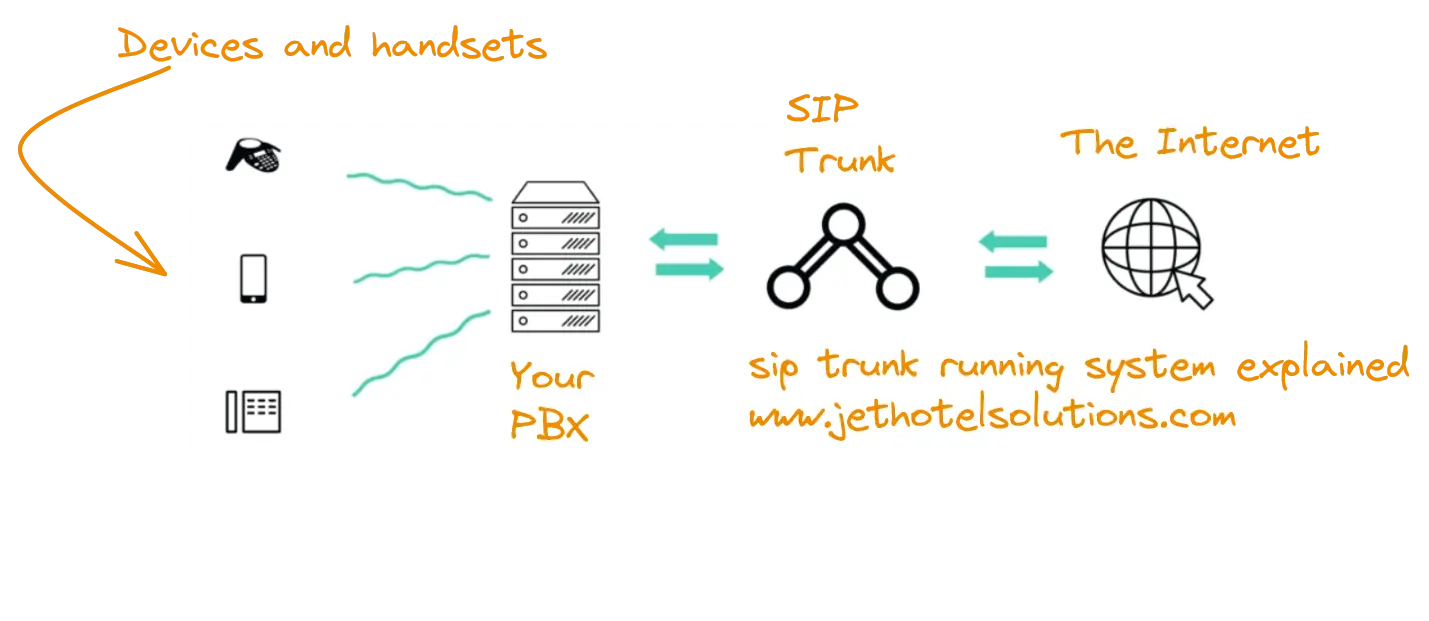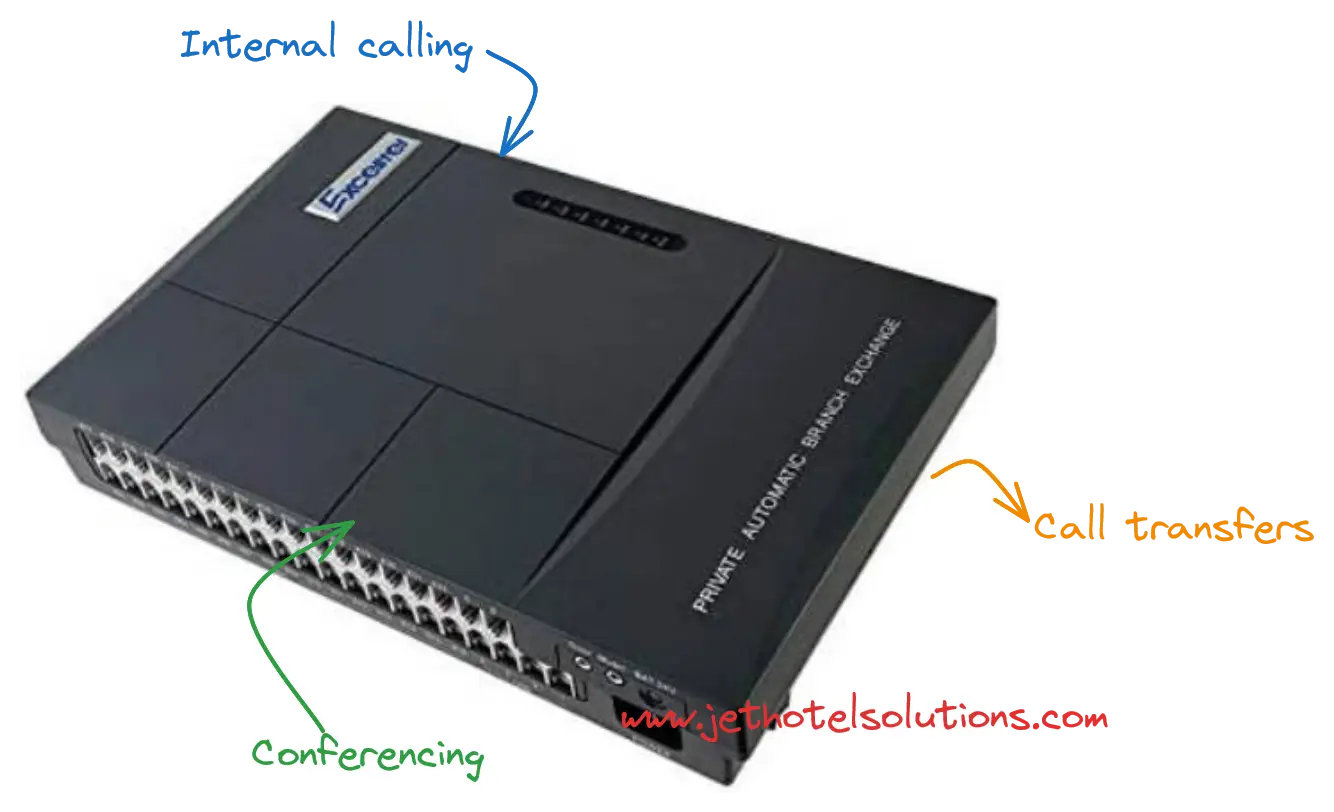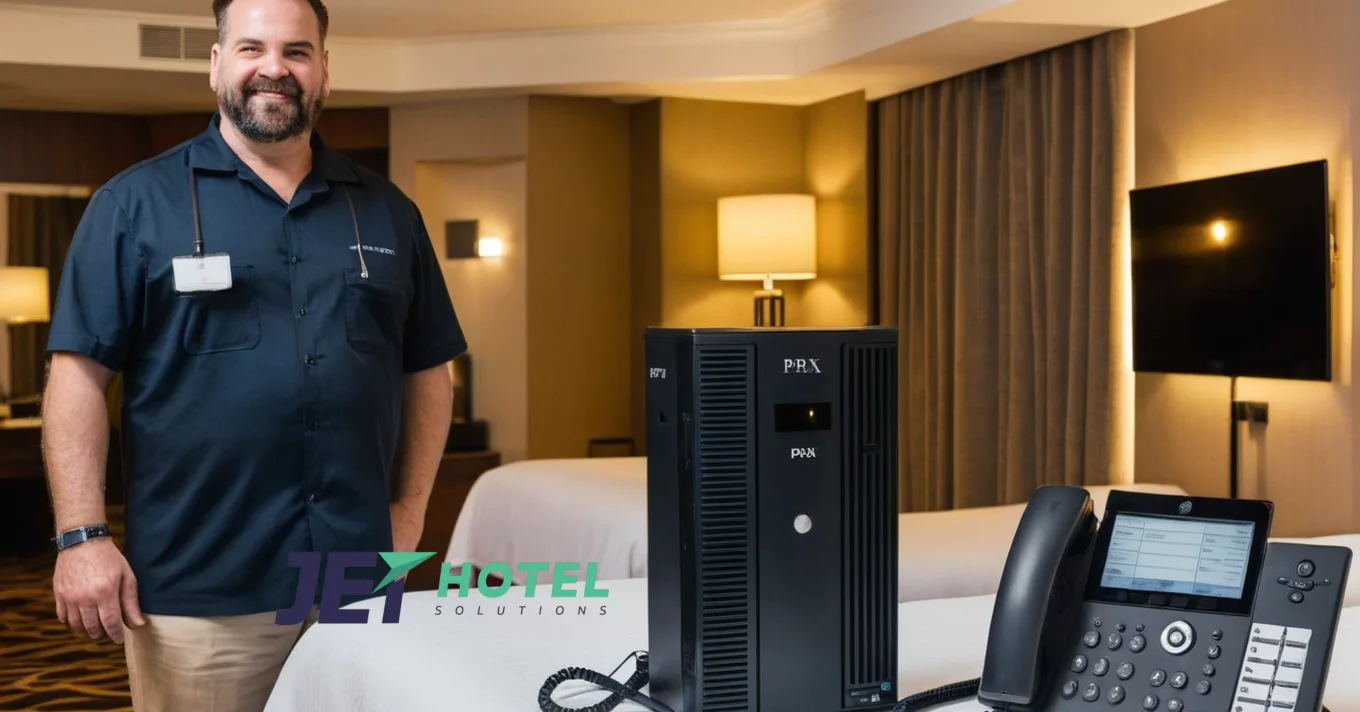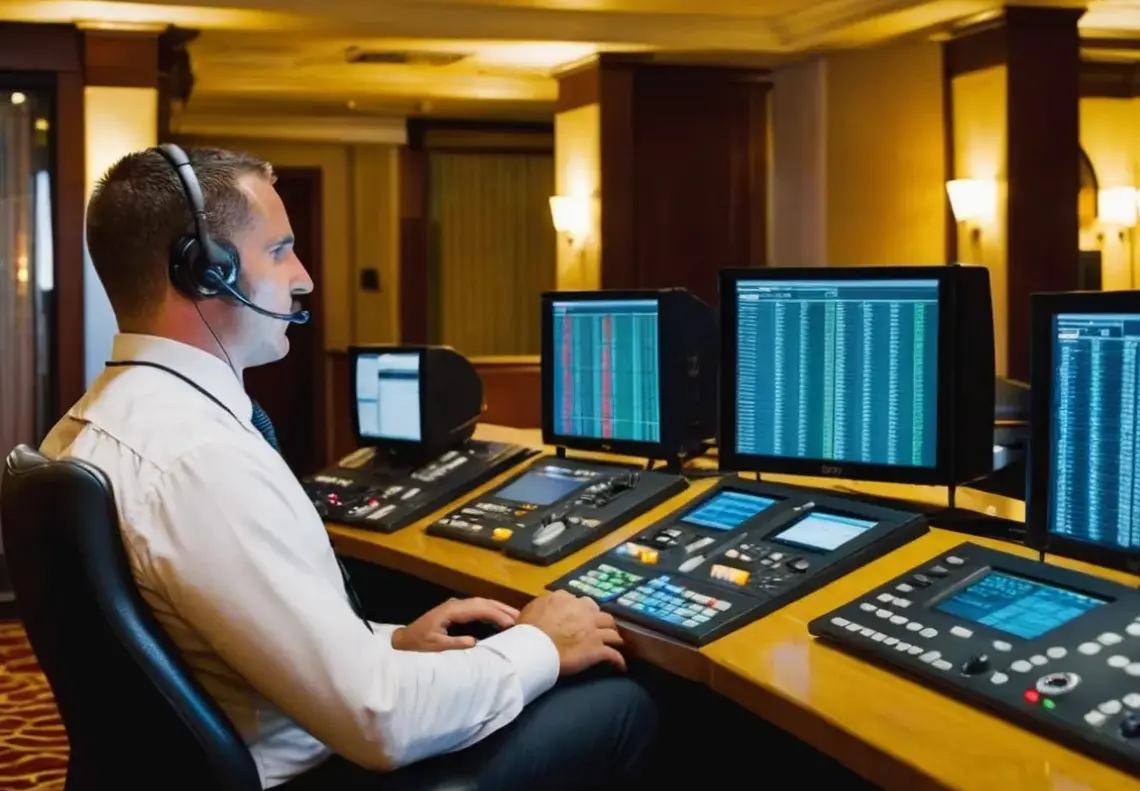A hotel’s ability to deliver exceptional guest experiences hinges on having a robust, reliable communications system in place. From booking reservations to modifying existing ones, making secure payments over the phone, and ensuring calls are always answered promptly, a hotel’s phone system acts as the lifeline between staff and guests. That’s why more hotels are exploring modern solutions like SIP trunking and hosted PBX to equip their properties with the connectivity needed to keep up with guest expectations.
But between SIP trunking and hosted PBX, how do hotels know which solution is the right fit? What are the key differences hoteliers should consider when evaluating these leading phone systems? As a trusted leader providing customized communications solutions for hotels, we’re going to break down what you need to know about SIP trunking vs PBX.

What is a Hotel PBX?
First, let’s start with the basics – what exactly is a hotel PBX? PBX stands for private branch exchange, referring to the private telephone network used within a hotel to route calls. A PBX system connects the phones throughout your property, both for internal communications between hotel staff as well as for outbound and inbound calls with guests.

- Directing incoming reservation calls to your bookings team automatically by pressing 1 on the keypad.
- Allowing guests to contact the front desk, request wake-up calls, or order room service directly from their in-room phones.
- Managing call volume by placing callers in hold queues during busy times.
For many hotels, a PBX phone system acts as the command center driving connectivity across staff teams and optimizing the guest experience.
Understanding SIP Trunking
So how does SIP trunking fit into the hotel PBX ecosystem? SIP stands for Session Initiation Protocol, representing the process of connecting your existing on-site PBX system to the internet and phone networks through a VoIP service provider.
With SIP trunking, calls become powered over internet protocol rather than traditional analog phone lines. SIP trunks can integrate with your hotel’s current hardware, software, and infrastructure, meaning minimal disruption to existing systems. This allows hotels to keep using their preferred PBX solutions while upgrading connectivity through SIP.
By transporting calls as data packets over the internet, SIP trunking delivers expanded bandwidth, capabilities, and cost savings compared to legacy phone lines. Hotels can support more simultaneous calls, ensure reliability through built-in failover methods, and enable mobility by extending PBX features to offsite staff.
How PBX and SIP Trunking Work Together for Hotels
Now that we’ve reviewed both hotel PBX systems and SIP trunking independently, how do they work in conjunction to create the best phone environment for hotels?
SIP trunking acts as the conduit for your hotel PBX system, connecting it to the outside world through the internet. While the PBX handles call routing, auto-attendants, extensions, and other internal phone capabilities, the SIP trunks provide the pipeline for channeling calls in and out of your property over IP.

- Local Presence – SIP trunks allow hotels to display local phone numbers on outgoing calls for a familiar, trustworthy impression.
- Scalability – SIP trunking delivers unlimited capacity to support rising call volumes as your hotel grows.
- Resiliency – SIP “failover” methods reroute calls over alternate trunks if an outage occurs to prevent downtime.
- Consolidation – SIP trunks merge voice and internet onto one circuit, eliminating the need for multiple phone lines.
- Mobility – PBX features like call forwarding or transfers can be extended to mobile devices through SIP integration.
By leveraging both PBX functionality and SIP connectivity, hotels create a communications environment with the flexibility and reliability today’s guests expect.
Benefits of SIP Trunking for Hotels
Now that we’ve covered the basics, let’s explore the key benefits SIP trunking delivers for hotels when integrated with your PBX phone system:
Streamlined Guest Journeys
From booking to pre-stay communications to check-in and during their hotel stay, SIP trunking helps simplify and improve guest interactions. For example, intelligently routed calls prevent guests from being transferred multiple times to reach the right department. Or automated reservation changes free up staff while giving guests control.
Omnichannel Integration
SIP trunks enable your hotel PBX system to seamlessly integrate with other guest touchpoints like mobile apps, websites, messaging, in-room tablet controls, and IoT devices. This delivers a consistent, connected experience across channels.
Enhanced Call Center Operations
With robust analytics and features like skills-based call routing, SIP trunking optimizes your hotel call center operations. This means shorter hold times, precisely matched agents, and more efficient issue resolution.
Reliable Disaster Recovery
Providing call continuity is crucial for hotels in an emergency. With built-in resiliency and redundancy, SIP trunks enable uninterrupted uptime even if your main trunk goes down.
Remote Staff Connectivity
Whether they’re offsite or at home, SIP trunking allows hotel staff to stay seamlessly connected to your PBX system. This maintains excellent guest service and business continuity when working remotely.
Increased Cost Savings
By converging voice and internet into one network, SIP trunking drives significant cost reductions for hotels compared to maintaining separate analog lines and hardware. Less equipment, lower service costs, and reduced toll charges add up.
Enhanced Security
Leading SIP trunk providers implement robust security like call encryption, fraud monitoring, access control lists, and real-time threat detection to protect hotels from vulnerabilities and cybercrime.
Considering these powerful benefits, it’s clear why SIP trunking is becoming the preferred connectivity choice enabling hotel PBX systems to deliver the smooth, flawless guest experiences today’s travelers expect.
Hosted PBX: A Strong Option for Hotels
Now that we’ve covered SIP trunking in-depth, let’s explore hosted PBX – also called cloud PBX – as another modern communications option with unique advantages for hotels.
With hosted PBX, all the phone system hardware and maintenance is hosted remotely by a third-party provider. This means hotels avoid having to purchase and install an on-site PBX system. There’s no need for extra equipment beyond desk phones and softphones for staff.

However, hotels do lose some control and customization ability relying on an external hosted PBX provider versus an on-site system. Changing settings or adding new features may take longer based on the provider’s roadmap and schedules.
Here are some other key advantages of hosted PBX phone systems:
- Lower Upfront Costs – No need to invest in an expensive on-site PBX system and phones.
- Predictable Operating Expenditures – Simple monthly subscription model.
- Quick Implementation – Phones are shipped preconfigured to allow fast deployment.
- Automatic Updates – System administered and kept up-to-date by provider.
- Scalability – Hosted PBX can easily scale up or down as your hotel’s needs change.
- Business Continuity – If one location goes down, calls seamlessly rollover to another site.
For hotels that prefer hands-off phone system management, don’t have large internal IT teams, or have multi-location properties, hosted PBX presents an affordable and agile communications option to consider.
Comparing SIP Trunking vs Hosted PBX for Hotels
When it comes to choosing the best phone system for your hotel, how do SIP trunking and hosted PBX compare? Let’s outline some key differences between the two solutions:
- Upfront Costs – Hosted PBX has lower initial purchase costs. SIP trunking requires an existing or new on-site PBX system.
- Ongoing Costs – SIP trunking eliminates analog line fees, driving lower monthly costs at scale versus hosted.
- Installation and Configuration – Hosted PBX can be rolled out quickly. SIP trunking requires on-premise integration.
- Customization – SIP enables hotels to tailor PBX capabilities. Hosted options have more limitations.
- Call Quality & Reliability – SIP provides enterprise-grade voice quality, reliability, and security. Hosted PBX depends on provider’s infrastructure.
- Scalability – SIP delivers unlimited, on-demand capacity. Hosted PBX scaling can be slower based on provider.
- Internal Resources – Hosted PBX is managed externally. SIP trunking requires in-house PBX expertise.
By understanding these tradeoffs, hotel IT teams can determine which system best aligns to their property’s requirements, resources, and capabilities.
While SIP trunking requires more upfront and ongoing effort, it delivers unmatched voice quality, control over your hotel’s features, and enterprise-class reliability. Hosted PBX offers faster deployment with less reliance on internal resources.
Ultimately, hotels need to weigh factors like existing infrastructure, IT bandwidth, scale, budgets, and desired feature set when choosing between SIP or hosted PBX solutions.
The Path Forward for Hotel Communications
In today’s guest-centric landscape, travelers expect seamless, flawless communications experiences at every touchpoint. Outdated legacy phone systems lead to frustrating experiences like dropped calls, interminable transfers, and uninformed staff.
That’s why considering modern solutions like SIP trunking and hosted PBX are key steps forward for hotels. Taking the time to properly evaluate your property’s needs will ensure you create a phone environment able to satisfy guest expectations well into the future.
With our decades of experience advising hotels on optimizing their communications for success, we’re here to guide you through the process of determining the right phone system for your specific requirements. Get in touch with our team today to start a conversation and begin developing a telephony strategy future-proofed for long-term guest satisfaction.
